福柯 权利话语理论
“话语—权力”视域中的艺术定义问题

“话语—权力”视域中的艺术定义问题我们需要理解话语—权力的概念。
话语—权力理论最早由法国哲学家米歇尔·福柯提出,他认为权力是通过话语来实施的,在话语中包含了权力的运作和表达。
这意味着权力不仅仅是通过暴力或法律来执行的,更多的是通过语言和符号来构建和维持。
在这种理论框架下,我们不难理解为什么话语—权力会对艺术定义产生影响。
话语—权力在规定艺术定义的过程中发挥着怎样的作用?在话语—权力的视域中,艺术定义常常被视为一种权力技术和话语战略。
艺术定义的权力不仅表现在对艺术界和文化市场的规范中,更体现在对个体身份和意识形态的塑造中。
话语—权力通过各种方式来规定和限定艺术的范畴和内涵,从而影响到我们对艺术的认知和评价。
话语—权力也在艺术定义的争夺和辩论中发挥着作用。
在不同的话语体系和权力结构之间,艺术定义常常成为一种权力斗争和意识形态冲突的焦点。
这种权力斗争和辩论不仅体现在对艺术作品的评价和解读中,更体现在对艺术定义本身的理解和权威性的挑战中。
话语—权力对艺术定义产生了哪些问题和挑战?话语—权力引发了对艺术定义的多元化和批判性思考。
在传统的权力结构下,艺术定义往往是单一和垄断的,而在话语—权力的视域中,我们需要更加关注不同话语体系和权力结构之间的互动和碰撞。
这就要求我们对艺术定义进行更加多元和批判性的思考,不再停留在某一种权威定义之下,而是积极探索和尝试不同的艺术定义方式和路径。
话语—权力引发了对艺术实践和主体性的反思和批判。
在话语—权力的视域中,艺术定义往往成为一种话语和权力的工具和技术,我们需要对这种权力结构和话语规范进行反思和批判。
这就要求我们不再将艺术定义看作是一种单纯的概念和规范,而是要从艺术实践和主体性的角度出发,重新审视和思考艺术定义的价值和意义。
在这个过程中,我们需要更加关注和支持那些被忽视和边缘化的艺术实践和主体,为他们提供更广阔和开放的艺术定义空间,从而促进艺术的多元化和包容性。
福柯的“话语与权力”及其传播学意义
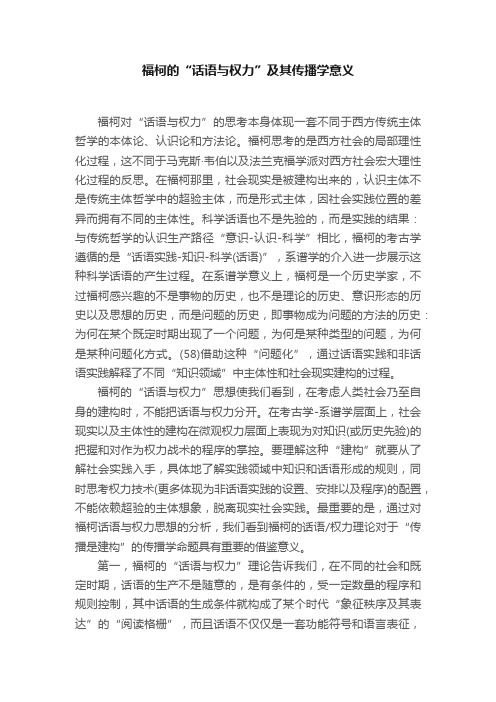
福柯的“话语与权力”及其传播学意义福柯对“话语与权力”的思考本身体现一套不同于西方传统主体哲学的本体论、认识论和方法论。
福柯思考的是西方社会的局部理性化过程,这不同于马克斯·韦伯以及法兰克福学派对西方社会宏大理性化过程的反思。
在福柯那里,社会现实是被建构出来的,认识主体不是传统主体哲学中的超验主体,而是形式主体,因社会实践位置的差异而拥有不同的主体性。
科学话语也不是先验的,而是实践的结果:与传统哲学的认识生产路径“意识-认识-科学”相比,福柯的考古学遵循的是“话语实践-知识-科学(话语)”,系谱学的介入进一步展示这种科学话语的产生过程。
在系谱学意义上,福柯是一个历史学家,不过福柯感兴趣的不是事物的历史,也不是理论的历史、意识形态的历史以及思想的历史,而是问题的历史,即事物成为问题的方法的历史:为何在某个既定时期出现了一个问题,为何是某种类型的问题,为何是某种问题化方式。
(58)借助这种“问题化”,通过话语实践和非话语实践解释了不同“知识领域”中主体性和社会现实建构的过程。
福柯的“话语与权力”思想使我们看到,在考虑人类社会乃至自身的建构时,不能把话语与权力分开。
在考古学-系谱学层面上,社会现实以及主体性的建构在微观权力层面上表现为对知识(或历史先验)的把握和对作为权力战术的程序的掌控。
要理解这种“建构”就要从了解社会实践入手,具体地了解实践领域中知识和话语形成的规则,同时思考权力技术(更多体现为非话语实践的设置、安排以及程序)的配置,不能依赖超验的主体想象,脱离现实社会实践。
最重要的是,通过对福柯话语与权力思想的分析,我们看到福柯的话语/权力理论对于“传播是建构”的传播学命题具有重要的借鉴意义。
第一,福柯的“话语与权力”理论告诉我们,在不同的社会和既定时期,话语的生产不是随意的,是有条件的,受一定数量的程序和规则控制,其中话语的生成条件就构成了某个时代“象征秩序及其表达”的“阅读格栅”,而且话语不仅仅是一套功能符号和语言表征,更重要的是在话语的背后存在着一套权力关系。
福柯话语理论探要
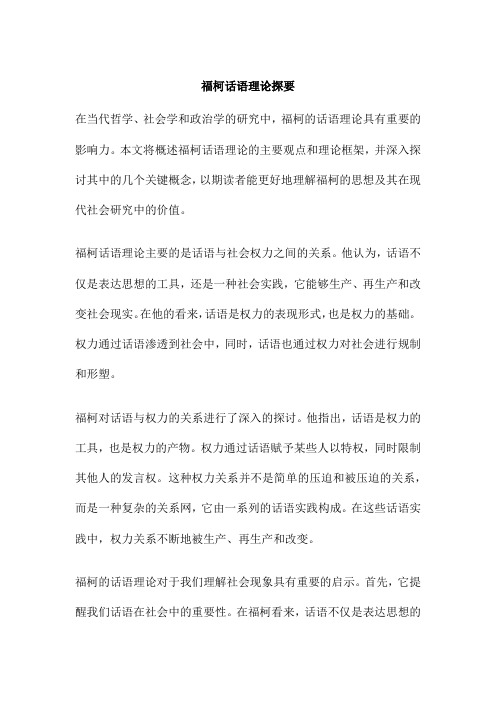
福柯话语理论探要在当代哲学、社会学和政治学的研究中,福柯的话语理论具有重要的影响力。
本文将概述福柯话语理论的主要观点和理论框架,并深入探讨其中的几个关键概念,以期读者能更好地理解福柯的思想及其在现代社会研究中的价值。
福柯话语理论主要的是话语与社会权力之间的关系。
他认为,话语不仅是表达思想的工具,还是一种社会实践,它能够生产、再生产和改变社会现实。
在他的看来,话语是权力的表现形式,也是权力的基础。
权力通过话语渗透到社会中,同时,话语也通过权力对社会进行规制和形塑。
福柯对话语与权力的关系进行了深入的探讨。
他指出,话语是权力的工具,也是权力的产物。
权力通过话语赋予某些人以特权,同时限制其他人的发言权。
这种权力关系并不是简单的压迫和被压迫的关系,而是一种复杂的关系网,它由一系列的话语实践构成。
在这些话语实践中,权力关系不断地被生产、再生产和改变。
福柯的话语理论对于我们理解社会现象具有重要的启示。
首先,它提醒我们话语在社会中的重要性。
在福柯看来,话语不仅是表达思想的工具,还是一种社会实践,能够生产、再生产和改变社会现实。
其次,福柯的话语理论使我们更加深入地理解了权力与话语之间的关系。
他指出,权力并不是简单地通过话语来行使的,而是通过一系列的话语实践来生产和再生产的。
最后,福柯的话语理论启示我们社会中权力关系的复杂性和多样性。
在福柯看来,权力关系是一种复杂的关系网,它涉及到一系列的话语实践,而这些话语实践又是不断地被生产、再生产和改变的。
总之,福柯的话语理论是一种深刻而富有启发性的理论。
它使我们更加深入地理解了话语与社会权力之间的关系,并启示我们社会现象的复杂性和多样性。
在今天的社会研究中,福柯的话语理论仍然具有重要的启示意义。
通过对话语和权力的深入研究,我们可以更好地理解社会现象的本质和规律,为构建更加公正、平等和开放的社会提供有力的思想武器。
引言德语话语语言学作为一门独立的学科,其发展历程深受不同理论和思想的影响。
浅析福柯的话语权力理论
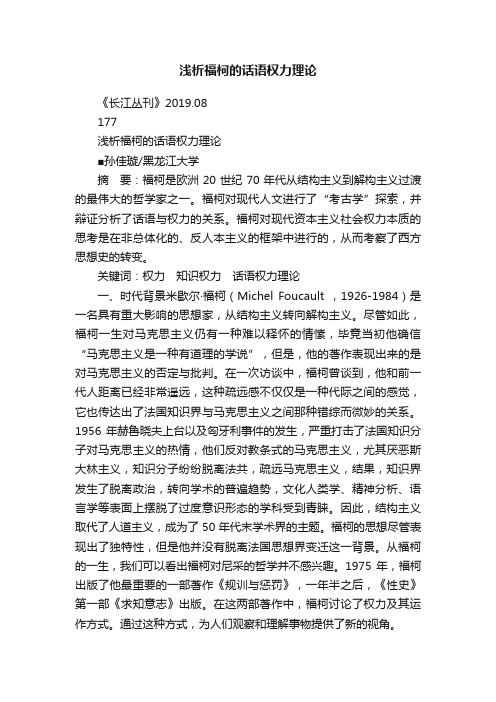
浅析福柯的话语权力理论《长江丛刊》2019.08177浅析福柯的话语权力理论■孙佳璇/黑龙江大学摘要:福柯是欧洲20世纪70年代从结构主义到解构主义过渡的最伟大的哲学家之一。
福柯对现代人文进行了“考古学”探索,并辩证分析了话语与权力的关系。
福柯对现代资本主义社会权力本质的思考是在非总体化的、反人本主义的框架中进行的,从而考察了西方思想史的转变。
关键词:权力知识权力话语权力理论一、时代背景米歇尔·福柯(Michel Foucault ,1926-1984)是一名具有重大影响的思想家,从结构主义转向解构主义。
尽管如此,福柯一生对马克思主义仍有一种难以释怀的情愫,毕竟当初他确信“马克思主义是一种有道理的学说”,但是,他的著作表现出来的是对马克思主义的否定与批判。
在一次访谈中,福柯曾谈到,他和前一代人距离已经非常遥远,这种疏远感不仅仅是一种代际之间的感觉,它也传达出了法国知识界与马克思主义之间那种错综而微妙的关系。
1956年赫鲁晓夫上台以及匈牙利事件的发生,严重打击了法国知识分子对马克思主义的热情,他们反对教条式的马克思主义,尤其厌恶斯大林主义,知识分子纷纷脱离法共,疏远马克思主义,结果,知识界发生了脱离政治,转向学术的普遍趋势,文化人类学、精神分析、语言学等表面上摆脱了过度意识形态的学科受到青睐。
因此,结构主义取代了人道主义,成为了50年代末学术界的主题。
福柯的思想尽管表现出了独特性,但是他并没有脱离法国思想界变迁这一背景。
从福柯的一生,我们可以看出福柯对尼采的哲学并不感兴趣。
1975年,福柯出版了他最重要的一部著作《规训与惩罚》,一年半之后,《性史》第一部《求知意志》出版。
在这两部著作中,福柯讨论了权力及其运作方式。
通过这种方式,为人们观察和理解事物提供了新的视角。
二、权力体系如何维系我们的社会《规训与惩罚》这部著作是福柯运用系谱学分析权力—知识机制的最重要成果,这本书的副标题是“监狱的诞生”,福柯的意图是通过揭示西方社会监狱历史和监狱制度发展的历史分析,揭示权力体系是如何维系我们社会的。
福柯权力话语课件

福柯权力话语
18
具体表现为:
• 1、特定领域中的权力关系为特定知识/话语的形成提供了可能的 认识对象。
• 2、特定领域中的权力关系也为特定知识/话语的形成提供了必要 的条件和途径。
福柯权力话语
19
——福柯
福柯权力话语
17
• 权力是话语的生产者和建构者。在现代社会中,权 力和知识之间是相互渗透、相互建构的。 权力的形 成须要以一系列有关对象和过程的话语的形成与使 用为手段。这些相关话语的形成与使用是权力关系 和权力机制的内在组成部分。没有这样一些话语的 形成与使用,权力就无法有效运作。因此,这些权 力关系的实施或实现过程,必然同时也就是相关话 语的形成和使用过程。权力通过话语的直接生产来 对话语的形成、保存、分布和流传发挥作用。
福柯权力话语
2
• 6、历史只是历史中各要素不断离散和重组的水平域展开,没有 任何终极目标在引导历史。
• 7、许多人之所以没有成功,不是因为在奋斗的过程中败给了强 劲的对手,而是还没有努力就放弃了。一个对自己没有信心,不 敢去争取,不敢去拼搏的人,永远无法获得成功。
福柯权力话语
3
主要作品
• 《疯癫与文明》(1961) • 《临床医学的诞生》(1963) • 《词与物》(1966) • 《知识考古学》(1969) • 《规训与惩罚》(1975) • 《性史》(第一卷《认知的意志》1976
13
什么是权力?
对于福柯来说,“权力”是一个尚未规定的、推论的、非主体化的 生产性过程,它把人不断地构成和塑造为符合一定社会规范的主 体。它本质上不是压迫性的,而是生产性力量,它只“关注生产 性力量,让它们发展并且规范它们,而不愿阻碍它们、压抑它们 或者毁灭它们”。
福柯的“话语与权力”及其传播学意义

福柯的“话语与权力”及其传播学意义传播学当下是一个“建构话语体系”的时代,逢“话语”必谈福柯。
在以《话语与社会变迁》而闻名的英国话语分析学者诺曼•费尔克拉夫看来,福柯对话语概念及其分析方法的普及做出了贡献,他“对社会科学和人文科学产生了巨大的影响,'话语'概念的流行,话语分析作为一种方法的流行,可以部分地归因于这种影响。
”①不过,由于福柯的研究存在着阶段性一一前期的考古学更多强调话语形成的规则性与条件一一后期的系谱学更关注话语历史性中权力的作用,致使诸多对福柯话语理论的引用只关注话语的“话语实践”特征, 把话语看成一个生产主体和社会现实的机器,而无视“权力”对主体性和社会现实的微观建构。
本文将采用历史实证主义的方法,通过对福柯的“话语与权力”思想的文献分析,强调福柯的话语和权力是不可分离的,“话语和权力”的互动是理解现实秩序建构的关键。
本文分为五个部分:第一是福柯的思维理路;第二是福柯话语的界定与分析;第三是福柯权力的界定与特征;第四是福柯的“话语与权力”关系;最后是福柯“话语与权力”思想的传播学意义。
一、福柯的思维理路(一)哲学的作用康德的《什么是启蒙?》是福柯“当下哲学”的重要依据。
在康德看来,启蒙就是人类用自己的理智摆脱自己所加之于自身的不成熟状态。
福柯认为,“康德的作品是第一次一个哲学家从内部紧密地把自己作品的认识意义、对历史的反思与特殊时刻的特殊分析联系在一起。
对作为历史差异的‘今天’的反思以及把'今天'作为一种特殊哲学任务主旋律的思考是‘什么是启蒙’的新颖之处J②早在1967 年,福柯在尼采的影响下就指出,“哲学的作用是分析作用。
实际上,哲学已经不是去喜欢说永久存在的东西。
[现在],哲学拥有更艰难和难以捕获的任务:去说发生的事情。
”③于是在福柯处,哲学的任务不但是要分析过去被我们合理化的现实,而且还要超越这种合理化过程所带的限制,生产新的主体。
福柯所做的批判“不是去寻找具有普世价值的形式结构,而是对一些事件的历史研究,这些事件使我们成为我们自己、成为我们的所做、所思与所说东西的主体。
福柯的话语权

福柯的话语权————————————————————————————————作者:————————————————————————————————日期:傅柯的“话语理论”简述1、话语权概述“话语权”成为当代一个非常时髦的词,出现在人文社会科学研究的方方面面,在国内被人们频繁使用,在许多研究领域都运用傅柯的“话语权理论”来阐述自己的观点。
上至学者,下至普通百姓,大家似乎都对“话语”和“话语权”的含义甚是了然。
不同的学者在他们不同的学术领域中都多次提到对相关“话语”和“话语权”的理解,有人论述女性文学与女性主义的“话语权”,有人论述亚裔文学在国外的“话语权”,有人论述中国农民的“话语权”,有人论述民间文学的“话语权”,也有人研究建筑设计中的“话语权”,还有很多学者运用“话语权”这一较为复杂的概念来进行文本细读和分析,比如利用话语权来阐述某些特殊翻译现象等等。
话语作为人认识世界的工具,作为人与人相互交流和沟通的工具,作为与思想直接对应的关系,其存在初期仿佛被认为是自然而然的事情,并不为人们所重视,但随后对话语的认识与研究却越来越丰富和深入,事物各式各样的存在激起人们的思考,而思考又需要一个中介来“想”和“表述”,思考的结果也需要一个承载体来表达和外化。
因此,在后现代主义看来,话语是极其重要的中介,人类所知所晓的一切,人类所建构起来的所有文明,都是通过话语这个中介作为传递手段并最终完成的。
独特的话语由个体的出生、家庭背景、文化环境、时代风貌等诸多因素综合而成,正是有了独特的话语,才由话语建构起了独特的个体。
国内外学界对于话语是有一番深入分析和研究的。
语言学界对话语做的界定是:“‘话语’通常有两种理解:狭义的理解是与篇章相对,指口头说出来的一句句话;广义的理解指言语交际行为体现出来的由词句构成的言语表达形式,它既可以是口语体,也可以是书面体。
”这种广义的理解与语言学家索绪尔的“言语”概念较为接近。
2、傅柯的话语权法国思想家米歇尔·傅柯是当代西方著名的后现代哲学家,学术研究广泛且深刻,出版过多部学术著作,其影响渗入到社会学、政治学、精神病学、医学、心理学、文学艺术等多个领域,但修辞学只研究其著作中以话语为中心的观点。
从福柯权力话语理论看文学话语-精选文档

从福柯权力话语理论看文学话语话语和权力是福柯哲学体系中两个重要的概念,在前期的《知识考古学》中,福柯重在话语的自主分析,认为话语是“隶属于同一的形成系统的陈述整体。
”我们不要问“话语说了什么”,而应追问“话语何以存在?”,力求提供一种话语实现多元的策略。
在这样的哲学范畴内,所有的话语都有存在的权利,然而,为什么有的话语走入了历史,有的话语却永远消失在历史之外了呢?福柯后期将权力概念引入话语,提出话语的权力控制分析,其实依然执着于话语可能或者不可能的条件的探询。
作为著名的权力思想家,福柯的权力观有创新之处。
传统的权力观将权力看作一种实体,认为权力是夺得统治的阶级的“所有权”,看作是可以被某些人或者某些团体所占有的东西。
而福柯认为,权力并非一种实体,而是一种关系。
他说:“权力不是获得、取得的或分享的某个东西,也不是我们保护或回避的某个东西,它从数不清的角度出发在不平等的和变动的关系相互作用中运作着。
”这种权力作为一种关系作用于每一个人,无处不在,在社会的每一层之间,在男女之间,在家庭成员之间,在师生之间等等。
再有,传统的权力观经常将权力与限制、禁止、镇压紧密联系在一起,因此是否定性的。
福柯提醒人们,权力是一种很复杂的东西,在某些情况下权力的效果不仅是否定性的,而是生产性的。
权力几乎成为一个无所不在的本体贯穿在福柯后期理论中,作为一种势力关系,权力既是压抑的力量,又是建设的力量,对于文学来说,是否意味着所有的文学话语都参与了权力的运作?文学作为一种特殊的话语系统,究竟是否存在权力之争呢?在文学话语中,话语的控制原则将以何种面貌出现呢?在福柯看来,任何话语都是与权力紧紧缠绕在一起的,所以,文学作为一种话语,必然难以与权力脱离干系。
至于控制,无论在文学话语内部还是外部都存在。
对于权力在文学话语内部的运作可以分为不同文学话语之间和对单纯一个文学文本的控制分析。
对于不同的文学话语之间,福柯在《话语的秩序》中曾以荷马的《奥德赛》为例,在福柯看来,对它的串讲、注释、论述都是评论话语形式,相对《奥德赛》而言,都是次话语,即使对它的任何一种文学翻译,甚至象英国近代作家詹姆士?乔伊斯的巨著《尤里西斯》,同样也是次话语。
从权力话语到话语权力r——兼对福柯话语理论的一种哲学批判

从权力话语到话语权力r——兼对福柯话语理论的一种哲学批判李智【摘要】福柯的话语理论既是一种权力话语理论,又是一种话语权力理论,它揭示了话语与权力之间的同一性关系:话语是权力的话语,权力是话语的权力."话语权力"概念因此获得了一种新的理解.从本质上说,福柯的话语理论是一种话语本体论,带有强烈的话语拜物教色彩.该理论在一定程度上对人类实践产生了一种转向性的效应,即由物质实践转向话语实践.尤其是在政治领域,基于政治话语的话语政治成为一种重要的话语实践形式.这种话语实践所依据的话语本体论,其哲学基础是反实在论的,也是反人道主义的,因此,有必要在对它予以反思和批判的基础上,结合马克思主义的实践唯物主义来予以纠偏.【期刊名称】《新视野》【年(卷),期】2017(000)002【总页数】6页(P108-113)【关键词】话语理论;话语本体论;话语实践;反实在论;反人道主义【作者】李智【作者单位】中国传媒大学传播研究院北京市,100024【正文语种】中文【中图分类】B516进入20世纪,在整个西方哲学思想史上出现了一个语言(学)转向,即从探究世界本质——“世界是什么”——的本体论和如何认识世界的认识论转向如何表述世界的语言学。
而后,在人文社会科学中,又从语言(学)转向话语及话语理论和话语分析。
“‘话语转向’,是近年来发生在我们社会的知识中的最重要的方向转换之一。
”[1]在后一场转向中,法国哲学家、社会学家、后结构主义者米歇尔·福柯发挥了关键性的作用。
他是第一个彻底突破语言学的学科边界,从社会学的新视角重新观照和界定话语的人。
他从社会关系的角度深描了话语背后所蕴含的意义以及由此编织的权力关系网络,揭示出话语与权力之间的同一关系。
正是从这个意义上,他的话语理论可以称为权力话语理论或话语权力理论。
近年来福柯的话语理论在政治学界和政治实践领域颇为流行,有必要对它进行反思和批判,并结合马克思主义的实践唯物主义来予以纠偏。
福柯的权力理论

福柯的权力理论福柯的权利理论不同于传统的君权权力理论,福柯的权力观另辟蹊径,从话语、知识、身体等角度入手,给我们阐释了一种微观的权力理论。
相比起其他作家,福柯更加注重权力的发生和运作,他认为权力是无主体的,权力只存在于一种关系场域中,通过一种持续的微观方式对个体起作用。
在《性经验史》一书中,作者将“性”作为管理生命为中心的权力的主要目标,讨论性经验中的权力关系及其运作方式;而《规训与惩罚》则以身体作为研究权力关系运行的支点,分析权力如何依靠制约身体的“规训”程序贯穿于整个社会中的。
01生命权力这一权力的论述从“性压抑”假说开始,现代的性压抑源于17世纪,与资产阶级的秩序连为一体,性完全被视为繁衍后代的严肃的事,被家庭夫妇所垄断,未被纳入生育和繁衍活动的性没有立足之地,所以性的动机正当性是与政治动机正当性联系在一起的。
因此不难理解这一时期运用压抑来说明性与权力的关系的原因,此举是完全有利于说话者的,话语权的掌控者以此来为自身谋利。
作者在此背景下对“压抑假说”提出了三大怀疑,目的是为了把它重新纳入到17世纪以来的现代社会内部的性话语的一般结构中,认为我们要考虑全部“话语事实”和“性话语实践”,找出话语生产、权力生产和知识生产的要求。
三个世纪以来,西方人一直坚持全部坦白自己性事的这一目标;古典时代以来,性话语不断增加,地位也不断提高,大家希望通过这种审慎的分析话语对欲望产生转移、强化、重新定向和改变多重影响。
18 世纪以来,性就不断地激起一种普遍的话语亢奋,性话语在权力的范围之中,作为权力运作手段起作用。
现代社会的特点不是把性隐藏起来,而是在强调性是“秘密”的同时一直谈论性,性在语言被小心净化和大家不再直接谈性的情况下,落入了话语的掌控之中。
19世纪和20世纪时性话语增加的时代,各种性经验四处扩散,他们不相协调的形式得到了强化,各种“性倒错”成倍的插入进来,性倒错更明显的被话语和社会机制所控制。
最后作者呼吁我们必须抛弃近现代工业社会开启的性压抑不断增长的时代的假说。
福柯权力理论
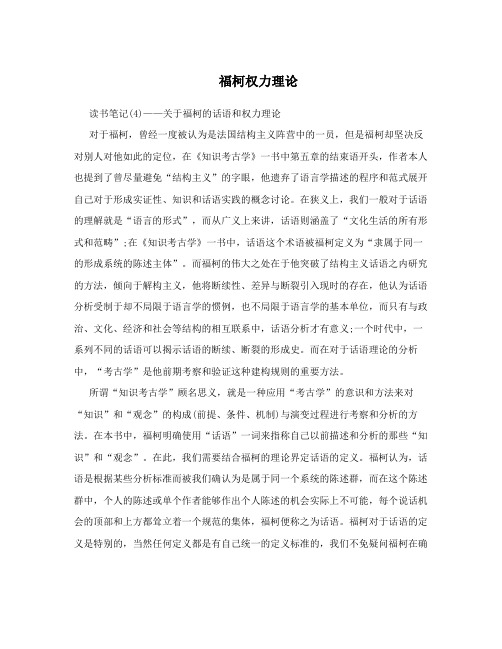
福柯权力理论读书笔记(4)——关于福柯的话语和权力理论对于福柯,曾经一度被认为是法国结构主义阵营中的一员,但是福柯却坚决反对别人对他如此的定位,在《知识考古学》一书中第五章的结束语开头,作者本人也提到了曾尽量避免“结构主义”的字眼,他遗弃了语言学描述的程序和范式展开自己对于形成实证性、知识和话语实践的概念讨论。
在狭义上,我们一般对于话语的理解就是“语言的形式”,而从广义上来讲,话语则涵盖了“文化生活的所有形式和范畴”;在《知识考古学》一书中,话语这个术语被福柯定义为“隶属于同一的形成系统的陈述主体”。
而福柯的伟大之处在于他突破了结构主义话语之内研究的方法,倾向于解构主义,他将断续性、差异与断裂引入现时的存在,他认为话语分析受制于却不局限于语言学的惯例,也不局限于语言学的基本单位,而只有与政治、文化、经济和社会等结构的相互联系中,话语分析才有意义;一个时代中,一系列不同的话语可以揭示话语的断续、断裂的形成史。
而在对于话语理论的分析中,“考古学”是他前期考察和验证这种建构规则的重要方法。
所谓“知识考古学”顾名思义,就是一种应用“考古学”的意识和方法来对“知识”和“观念”的构成(前提、条件、机制)与演变过程进行考察和分析的方法。
在本书中,福柯明确使用“话语”一词来指称自己以前描述和分析的那些“知识”和“观念”。
在此,我们需要结合福柯的理论界定话语的定义。
福柯认为,话语是根据某些分析标准而被我们确认为是属于同一个系统的陈述群,而在这个陈述群中,个人的陈述或单个作者能够作出个人陈述的机会实际上不可能,每个说话机会的顶部和上方都耸立着一个规范的集体,福柯便称之为话语。
福柯对于话语的定义是特别的,当然任何定义都是有自己统一的定义标准的,我们不免疑问福柯在确认某些分散在不同时空区域内陈述能够属于同一“话语”类型或陈述群时的标准是什么,这也正是福柯在《知识考古学》中探讨的一个重要方面。
福柯对此有四个方面的结论。
第一,我们可以根据对象方面的统一性;第二,根据表达形式和连贯类型方面的同一性;第三,根据所用概念系统的统一性;第四,根据主题方面的统一性。
权利话语理论

浅谈《追风筝的人》中的权力话语理论摘要:《追风筝的人》是勒德·胡赛尼的第一部小说。
本文将运用米歇尔·福柯的权力话语理论对该小说进行解读,分析其中的三组权力关系及其之间的话语,从而更深刻的体会小说主题,并使文学理论更好的与文学作品相衔接。
关键词:《追风筝的人》;米歇尔·福柯;权力话语;沉默中图分类号:i106 文献标识码:a文章编号:1005-5312(2012)21-0077-01《追风筝的人》,作者勒德·胡赛尼。
《追风筝的人》是他的第一本小说。
小说由第一人称视角,讲述了一个身在美国的阿富汗移民童年的往事和他成人后对儿时过错的心灵救赎过程。
米歇尔·福柯(1926-1984),法国后现代思潮的前卫人物、结构主义哲学家,他以自己独特的方式将人们的视线转向在西方哲学以及思想的研究历史中向来被忽视的一些方面,例如:疯癫,医学史,规训及其制度,性欲。
福柯所说的权力是“支配人体的政治技术”。
权力一方面借助话语实现自身的价值,一方面又是影响和控制话语最根本的因素。
但是真正的权力又通过话语来实现,就是这样一种权力话语,它有着巨大的力量和权威性。
福柯的话语理论的基本观念是“人是受话语支配的”。
所谓话语是:思想的物质表现,不仅决定思想,而且影响人的身体。
一、《追风筝的人》中体现的权力关系篇二:话语与权力话语与权力 *戏剧《人民公敌》的情节概括起来说的就是:科学家兼医生斯多克芒发现本城镇的浴场矿泉里含有多种非常危险的传染病菌,因而他坚持全部工程必须进行改造;而他的哥哥彼得作为市长兼浴场委员会主席则坚决反对这一改造计划,其理由是改造浴场需要二三十万克罗纳,且要停止经营两年,这既损害了资本筹集者的利益,也不符合城镇市民的利益。
我们完全可以把这看作两个不同的阶级围绕各自不同利益而展开的一场冲突与斗争。
也可以在这基础上,把斯多克芒医生最后的失败原因,一方面归咎于他个人缺乏斗争经验和群众觉悟的有待提高两个因素,另一方面可以把失败的原因归咎于官僚势力和资产阶级势力的勾结及其狡猾的本性。
福柯福柯的话语、权力概念
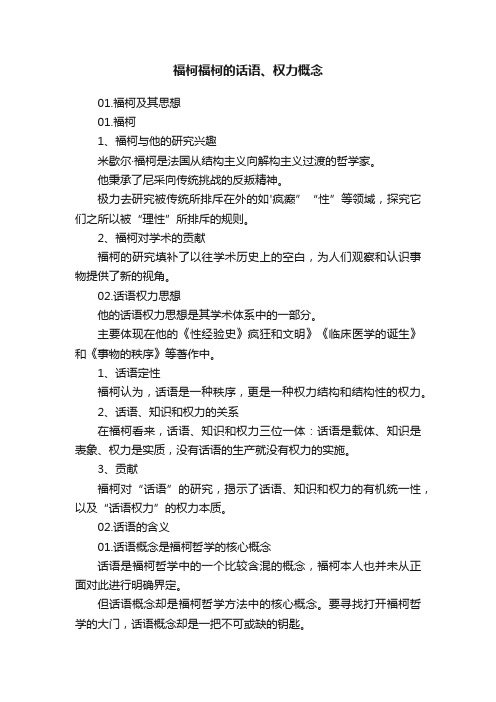
福柯福柯的话语、权力概念01.福柯及其思想01.福柯1、福柯与他的研究兴趣米歇尔·福柯是法国从结构主义向解构主义过渡的哲学家。
他秉承了尼采向传统挑战的反叛精神。
极力去研究被传统所排斥在外的如'疯癫”“性”等领域,探究它们之所以被“理性”所排斥的规则。
2、福柯对学术的贡献福柯的研究填补了以往学术历史上的空白,为人们观察和认识事物提供了新的视角。
02.话语权力思想他的话语权力思想是其学术体系中的一部分。
主要体现在他的《性经验史》疯狂和文明》《临床医学的诞生》和《事物的秩序》等著作中。
1、话语定性福柯认为,话语是一种秩序,更是一种权力结构和结构性的权力。
2、话语、知识和权力的关系在福柯看来,话语、知识和权力三位一体:话语是载体、知识是表象、权力是实质,没有话语的生产就没有权力的实施。
3、贡献福柯对“话语”的研究,揭示了话语、知识和权力的有机统一性,以及“话语权力”的权力本质。
02.话语的含义01.话语概念是福柯哲学的核心概念话语是福柯哲学中的一个比较含混的概念,福柯本人也并未从正面对此进行明确界定。
但话语概念却是福柯哲学方法中的核心概念。
要寻找打开福柯哲学的大门,话语概念却是一把不可或缺的钥匙。
关于话语概念,概括起来主要包括以下含义。
02.含义一:话语是陈述的整体话语是一系列相关陈述的整体。
在《知识考古学》中,福柯说:“我们将把话语称为陈述的整体,因为它们隶属于同一个话语形成;……这是由有限的陈述构成的,我们能够为这些陈述确定存在条件的整体。
”1、对话语的理解即话语是由一系列相关的陈述所构成,是具体地同现代社会的文化制度及现代人的实际思想和生活方式紧密联系的那些话语体系及实践。
因此,福柯话语理论中的话语,主要指在特定社会文化条件下,为了一定目的而说出或写出的论证性话语,是伴随着说和写的过程所进行的一系列社会文化操作活动,是一系列事件。
2、并且,强调话语是一系列政治事件福柯明确指出:“必须将话语看作一系列事件,看作政治事件:通过这些政治事件,它运载着政权并由政权又反过来控制着话语本身。
权力话语文学理论
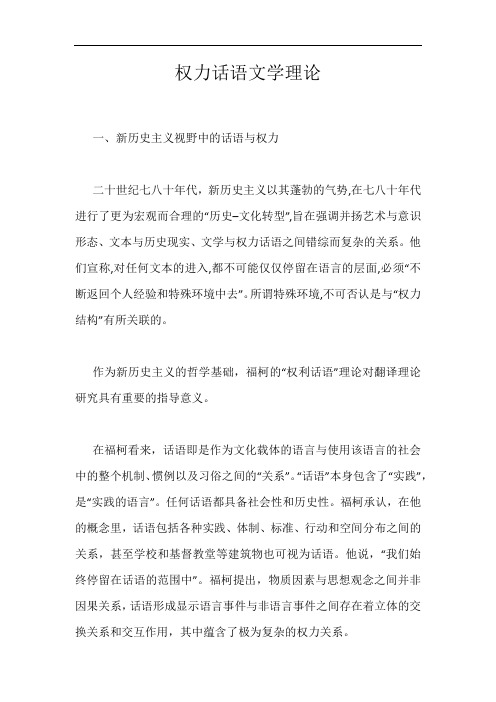
权力话语文学理论一、新历史主义视野中的话语与权力二十世纪七八十年代,新历史主义以其蓬勃的气势,在七八十年代进行了更为宏观而合理的“历史─文化转型”,旨在强调并扬艺术与意识形态、文本与历史现实、文学与权力话语之间错综而复杂的关系。
他们宣称,对任何文本的进入,都不可能仅仅停留在语言的层面,必须“不断返回个人经验和特殊环境中去”。
所谓特殊环境,不可否认是与“权力结构”有所关联的。
作为新历史主义的哲学基础,福柯的“权利话语”理论对翻译理论研究具有重要的指导意义。
在福柯看来,话语即是作为文化载体的语言与使用该语言的社会中的整个机制、惯例以及习俗之间的“关系”。
“话语”本身包含了“实践”,是“实践的语言”。
任何话语都具备社会性和历史性。
福柯承认,在他的概念里,话语包括各种实践、体制、标准、行动和空间分布之间的关系,甚至学校和基督教堂等建筑物也可视为话语。
他说,“我们始终停留在话语的范围中”。
福柯提出,物质因素与思想观念之间并非因果关系,话语形成显示语言事件与非语言事件之间存在着立体的交换关系和交互作用,其中蕴含了极为复杂的权力关系。
福柯的“系谱学”认为所有的知识行为同时就是权力行为。
这就将历史与权力、利益和意识形态之间的关联凸显出来了。
话语权力指话语中蕴含的强制力量或支配力量。
权力关系蕴藏于话语方式中,并以此种形式彰显权力的影响。
话语既是权利的表征,又衍生权力。
话语是权力的表征,是权力恩赐、挪用和争夺占有的客体,权力借用话语对人发挥压迫、操纵和解放的功能。
而这种功能效应的产生往往是及其隐蔽的,它通过语言的表述来达到价值和规范的建构,进而将这种价值与规范强加于或以潜移默化的方式传送给参与者,从而规范他们的思想行为与价值观念。
权力通过话语渗透到人们生活的各个领域之中,使其服从并被整合到社会秩序当中。
达到“话语的作用就是使人们实际上不能在话语之外进行思想。
”的目的。
当然,福柯也指出,话语虽是权力的表征,但它们并不完全对权力俯首帖耳。
基于福柯权力话语理论解读《山海情》中的女性形象

基于福柯权力话语理论解读《山海情》中的女性形象一、本文概述本文旨在通过福柯的权力话语理论来解读中国电视剧《山海情》中的女性形象。
福柯的理论提供了一个独特的视角,帮助我们理解权力和话语如何在社会和文化层面塑造和限制个体,特别是女性个体的身份和地位。
在《山海情》这部以20世纪90年代中国西北地区为背景的电视剧中,女性角色在贫困、艰苦的环境中,不仅展现了坚韧不拔的生活态度,也体现了她们在权力话语体系中的复杂定位。
本文将分析这些女性形象如何在家庭、社区和更广泛的社会结构中,通过话语实践来争取权力和表达自我,以及她们在面对权力压迫时如何保持自我认同和主体性。
通过这一分析,我们可以更深入地理解福柯权力话语理论在解读现实生活中的女性形象及其社会地位方面的应用,并探讨电视剧如何塑造和反映社会性别关系的复杂现实。
二、福柯权力话语理论概述米歇尔·福柯,作为20世纪最具影响力的思想家之一,他的权力话语理论为我们理解社会权力结构及其运行机制提供了新的视角。
福柯强调,权力并非仅仅是一种可以集中掌握和行使的力量,而是一种复杂的关系网络,它无处不在,无时不有,渗透于社会的每一个角落。
这种权力不是一种实体,而是一种关系,一种过程,它通过各种形式的话语来运作和体现。
在福柯的理论中,话语是权力的载体和工具,同时也是权力的对象。
话语不仅是人们交流思想的工具,更是塑造和限制人们思想和行为的重要手段。
话语可以塑造我们对世界的认知,影响我们的思维方式,进而决定我们的行为方式。
话语也是权力斗争的场所,不同的话语代表了不同的权力和利益,它们之间不断地进行斗争和协商,从而形成一种动态的权力关系。
福柯的权力话语理论强调权力的微观层面,即权力是如何在日常生活中通过各种细微的方式运作的。
他认为,权力并不是一种可以明确界定的实体,而是一种无处不在、无时不有的关系网络,它通过各种形式的话语来塑造和影响我们的思想和行为。
这种理论为我们理解《山海情》中的女性形象提供了重要的理论工具。
解读福柯“话语即权力”的哲学本质

解读福柯“话语即权力”的哲学本质展开全文文/王馥芳来自/阅读季“话语即权力”是法国哲学家、思想家米歇尔·福柯在其就职演讲《话语的秩序》中贡献给世界的一个最强隐喻之一,也是最为有力的哲学命题之一。
这一命题不仅仅把话语看成是“纸上苍生”,而且看成是对社会实践主体具有支配性和役使性的强大社会力量。
福柯把这种力量定义为“权力”,并由此得到了一个著名的哲学命题:话语即权力。
福柯所言的“权力”是指一种渗透于社会实践主体之中的、难以被人们感知,却又无所不在的“支配人体的政治技术”,是一种带有司法之立法功能的支配性社会力量。
这种支配性力量管约或者役使着社会实践主体,使其成为“合格”的社会人。
“话语即权力”的哲学渊源,可以追溯到德国存在主义哲学家海德格尔后期所提出的本体论主体间性思想。
从语言的本体性出发,海德格尔提出了“语言即思”的哲学命题。
“语言即思”颠覆了传统的说话者和语言之间的“说与被说”关系,而把说话者和语言之间的关系定义为一种“应合者与说”的关系。
“应合者与说”的关系不再是一种支配与被支配的主客体对立关系,而是一种说话者主体和对象主体(语言)之间的“主体间性”关系,两者相互对话、相互理解。
从本体论主体间性思想出发,福柯同样赋予话语以“主体间性”:“话语是真理、知识和权力的集中表现,是生活主体和对象能够相互交融的地方”。
所不同的是,因“思”是说话者本体自身的一部分,故海氏是在本体论的框架下探讨语言的主体间性。
而“权力”因是说话者本体之外的“他者”,是社会主体之中的一部分,福柯因此首次把话语从说话者主体之中剥离出去,使其成为一种制约、役使、支配或者界定社会实践主体的强大社会力量。
人类和话语之间的关系遂由海氏所定义的说话者主体间的共在关系,变身为社会实践主体间的共在关系。
把话语作为说话者主体自身的一部分延展到作为社会实践主体的一部分,福柯给话语赋予了社会主体性,从而使话语对社会实践主体具有支配意志。
《福柯权力话语理论下《砖巷》中纳兹奈恩的话语权分析》

《福柯权力话语理论下《砖巷》中纳兹奈恩的话语权分析》一、引言福柯的权力话语理论,揭示了社会中的权力关系如何影响话语的生成和传播,以及话语如何反过来塑造和巩固权力关系。
本文以福柯的权力话语理论为视角,对帕尔韦兹·伊克拉姆的长篇小说《砖巷》中纳兹奈恩这一人物的话语权进行深入分析。
在全球化背景下的印度与英国多元文化交汇的社会背景下,这一理论框架对于揭示作品中人物的权力和话语关系的相互作用有着独特的价值。
二、福柯权力话语理论简述福柯认为,权力和话语之间存在相互建构的关系。
一方面,话语通过语言的特定用法、习俗、制度等方式产生权力;另一方面,话语本身又是权力得以体现的媒介。
福柯进一步提出,权力不仅仅是外力对于人的压制和统治,而是包含了一种内在的社会机制,它以特定的语言游戏、知识体系和规则为基础。
在话语和权力的相互关系中,弱势群体的话语权常常被边缘化或忽略。
三、《砖巷》中纳兹奈恩的话语权分析《砖巷》以伦敦东区的一个移民社区为背景,讲述了一群人物的故事。
其中,纳兹奈恩作为来自印度贫困家庭的女性角色,其话语权在作品中具有独特的地位。
1. 边缘化的话语权纳兹奈恩由于自身家庭和社会地位的原因,其话语权在故事开始时显得边缘化。
这表现在她的言语在集体对话中经常被忽视或打断,她的观点和意见很少被重视。
这既是社会权力的体现,也是话语权力作用的结果。
2. 权力与话语的相互作用随着故事的发展,纳兹奈恩逐渐开始争取自己的话语权。
她通过自身的努力和智慧,逐渐改变了周围人对她的看法。
她的成功不仅是对她个人能力的肯定,也是对女性、移民等弱势群体话语权的肯定。
这一过程充分体现了权力与话语之间的相互作用。
3. 构建新的话语体系纳兹奈恩在争取话语权的过程中,也在不断构建自己的话语体系。
她用自己的语言和表达方式来描述自己的经历和感受,从而塑造了一个与主流社会不同的、具有独特文化背景的话语体系。
这一新的话语体系不仅反映了她的个人经历和感受,也反映了印度移民群体的文化背景和特点。
福柯 权利话语理论
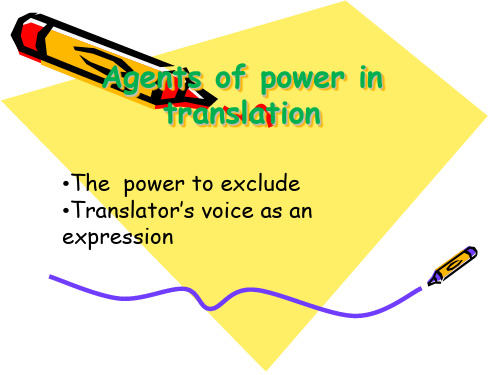
Examples A12.1a (Back-translation from Arabic)
What take root deep down are melancholy feelings which appear unobtrusive at first, only to become aggressive, with no hinges. At those moments of anger which recur so frequently, and which take innumerable forms . . .
(2) 没有绝对忠实的翻译, 翻译批评的标准应是: 知识的客 观性、解释的合理性、文本的定向限制性和译作的目 的功能性。这种批评才能揭示译作的效应史和文化建 构意义。
(3) 能够解释翻译实践中一些特殊现象: 译者选择特定的 原作、特定的翻译策略(如直译或意译、归化或异化、 节译或全译) 、译作的社会影响力, 都受到译入语社会 和译者个人的权力话语的操控。
• 翻译活动也不例外,它是权力话语制约作用下的产物,翻 译研究绝不可以只局限于作者、文本、译者之间,而应 置于大的文化视野中去。
翻译-多元文化操控的产物
翻译不是纯粹的文本之间的信息转换, 而是在译入语 文化的权力网络多元操控下对原文本的重写。“翻译实 际上是受一系列外部社会力量控制和支配的话语提纯 活动, 它的选择、组织、传播等过程无不受到来自社 会、文化、历史、思想、意识形态等多种有形与无形 的势力所左右和制约。
•权力话语理论(theory of power and discourse) •米歇尔·福柯(Michel Foucault)
简介
•法国思想家米歇尔·福柯(Michel Foucault, 1926-1984) 的 理论充满挑战性,其主要理论可以概括地表现为“知识型”、 “人之死”、“话语权力”、“谱系学”等重要事件。 •他的突出贡献在于始终坚持权利与话语权力的诉求方式与机制 的融合,进而围绕权力和知识这一核心问题,展开权力与真理、 权力与知识分子、权力与政治、权力与性、权力与后现代后殖 民问题的当代分析,因此被称为权利思想家而闻名世界。 •在福柯的一生中,不遗余力地置身于为被排除边缘的他者说话, 努力去发现被知识、权利压抑的异端和边缘化的东西,竭尽全 力让这些异端发出自己的声音,从而得到社会的承认和共鸣。 •福柯的这种思想被后殖民主义者,第三世界的人们所利用,于 是上世纪70-80年代产生了风靡全球的后殖民主义理论。
- 1、下载文档前请自行甄别文档内容的完整性,平台不提供额外的编辑、内容补充、找答案等附加服务。
- 2、"仅部分预览"的文档,不可在线预览部分如存在完整性等问题,可反馈申请退款(可完整预览的文档不适用该条件!)。
- 3、如文档侵犯您的权益,请联系客服反馈,我们会尽快为您处理(人工客服工作时间:9:00-18:30)。
简介
•法国思想家米歇尔·福柯(Michel Foucault, 1926-1984) 的 理论充满挑战性,其主要理论可以概括地表现为“知识型”、 “人之死”、“话语权力”、“谱系学”等重要事件。 •他的突出贡献在于始终坚持权利与话语权力的诉求方式与机制 的融合,进而围绕权力和知识这一核心问题,展开权力与真理、 权力与知识分子、权力与政治、权力与性、权力与后现代后殖 民问题的当代分析,因此被称为权利思想家而闻名世界。 •在福柯的一生中,不遗余力地置身于为被排除边缘的他者说话, 努力去发现被知识、权利压抑的异端和边缘化的东西,竭尽全 力让这些异端发出自己的声音,从而得到社会的承认和共鸣。 •福柯的这种思想被后殖民主义者,第三世界的人们所利用,于 是上世纪70-80年代产生了风靡全球的后殖民主义理论。
a. Constraints on the kind of language we use in translation(as opposed to original writing, for example).
b. Exclusion of a reader (coerced to read in a particular way), an author (committed to oblivion) or a translator (doomed to be invisible).
Examples A12.1a (Back-translation from Arabic)
What take root deep down are melancholy feelings which appear unobtrusive at first, only to become aggressive, with no hinges. At those moments of anger which recur so frequently, and which take innumerable forms . . .
(4) 翻译活动和译者在跨文化交流和文化建构中发挥不 可低估的作用。但译者并没有任意改造原作的特权, 必 须受到外部和内部制约。
(5)然而, 没有一种理论可以解决一切翻译问题。权力话 语理论更多适用于文学文本和社会文本, 不适于纯粹的 信息转换的科技翻译。
• 所谓“权力”,是指一切控制力与支配力。其中有有形的,如 政府机构、法律条文,例如:1954年我国曾召开了第一 次全国文学翻译工作会议;也有无形的,如意识形态、 道德伦理、文化传统与习俗、宗教思想、美学思想、价 值观念等等,例如:对雨果的《悲惨世界》书的初译。
• 人文科学本身只是一种权力和知识相结合的产物,它只 能是某一个时期的人文科学,是这一时期权力话语控制 的产物。
(2) 没有绝对忠实的翻译, 翻译批评的标准应是: 知识的客 观性、解释的合理性、文本的定向限制性和译作的目 的功能性。这种批评才能揭示译作的效应史和文化建 构意义。
(3) 能够解释翻译实践中一些特殊现象: 译者选择特定的 原作、特定的翻译策略(如直译或意译、归化或异化、 节译或全译) 、译作的社会影响力, 都受到译入语社会 和译者个人的权力话语的操控。
THE TRANSLATOR’S VOICE AS AN EXPRESSION OF POWER
•Varied views of status of the literary translators ➢“instinctive” (Rabassa)
➢“a complex mix of intuition and conscious choice involving thousands of decisions through which the translator is shaping and sustaining an interpretation” ➢Uncovering the “voice” of the ST and reproducing this in translation.
•Over-simplicity of syntax;
•Excessively explicit connectivity to signal text structure more transparently.
•Failure to do justice to, or in any way accurately convey, the variety of voices and the multiplicity of tones characteristic of the STs in question. •This usurping of ST ‘specificity’ and ‘uniqueness’ may be explained in terms of a complex power structure at work in doing any translation. (exclusion of readers) • Similarly, real or imagined target norms can also turn translation into an ideological weapon for excluding an author.
Example
I want translations with copious footnotes, footnotes reaching up like skyscrapers to the top of this or that page so as to leave only the gleam of one textual line between commentary and eternity. I want such footnotes and the absolutely literal sense, with no emasculation and no padding.
Agents of power in translation
•The power to exclude •Translator’s voice as an expression
•权力话语理论(theory of power and discourse) •米歇尔·福柯(Michel Foucault)
(A. Munif Endings (trans. Roger Allen), London: Quartet Books, 1998)
Features of language use in TT
•Cohesion by lexical variations (as opposed repetition, for example);
• 3. 权力话语理论的指导意义
福柯的权力话语理论对于翻译研究、翻译批评、翻译史、 翻译实践和翻译教学都有深远的指导意义:
(1) 为翻译研究提供了宏观视角, 将社会之维、历史之维引 入翻译研究, 从广度和深度上拓宽了翻译研究的领域。 深刻揭示了翻译活动的社会性、背后的操控因素和它 在文化建构中的重大作用, 使翻研究更为全面、辩证 和客观。
•The translator’s voice
The translator’s voice
‘Discursive presence’ called by Theo Hermans (1996:27)- the translator’s voice is always present, even if it is sometimes obscured, and may manifest itself (1) because of temporal or geographical distance from the ST, (2) in ‘self-referential’ texts marked by wordplays, and (3) in cases of ‘contextual overdetermination’ where a complex chain of identification may lead to omission or explanation by footnote (1996:40).
THE POWER TO EXCLUDE
• To ‘include’ or ‘exclude’ a particular kind of reader, a certain system of values, a set of beliefs or an entire culture.
• Written by one writer and translated by one translator.
(A. Munif Endings 1981)
Example A12.1b
Deep down, melancholy feelings take root. They may seem fairly unobtrusive at first. But people will often get angry. When this happens, these feelings burst out into the open, assertive and unruly. They can appear in a number of guises.
• 翻译活动也不例外,它是权力话语制约作用下的产物,翻 译研究绝不可以只局限于作者、文本、译者之间,而应 置于大的文化视野中去。
翻译-多元文化操控的产物
翻译不是纯粹的文本之间的信息转换, 而是在译入语 文化的权力网络多元操控下对原文本的重写。“翻译实 际上是受一系列外部社会力量控制和支配的话语提纯 活动, 它的选择、组织、传播等过程无不受到来自社 会、文化、历史、思想、意识形态等多种有形与无形 的势力所左右和制约。
(Nabokov 1955/2000:83)
Of course, Nabokov’s translation approach is also ideologically informed, an expression of his favoured poetics, and is a demonstration of his power as an author-translator. Such translations are by their very nature elitist and deliberately marginalize readers who do not share Nabokov’s view of language.
